Vodafone's Strategic Management: SWOT, PESTLE, & Porter's Five Forces
VerifiedAdded on 2024/05/29
|21
|5020
|306
Report
AI Summary
This report provides a comprehensive analysis of Vodafone's strategic management, focusing on both macro and micro environmental factors influencing the company's growth and development. It employs tools such as PESTLE analysis to evaluate political, economic, social, technological, legal, and environmental influences, and SWOT analysis to determine Vodafone's strengths, weaknesses, opportunities, and threats. The report also assesses Vodafone's internal environment using the McKinsey 7S model, examining elements like structure, strategy, skills, staff, style, systems, and shared values. Furthermore, Porter's Five Forces model is applied to analyze the competitive landscape, including the bargaining power of buyers and suppliers, the threat of new entrants and substitutes, and industry competition. The analysis culminates in a strategic growth management plan designed to address challenges and leverage opportunities for Vodafone in the telecommunications sector, highlighting the importance of adapting to environmental changes and internal capabilities for sustained success. Desklib provides this assignment solution and many other resources for students.

BUSINESS STRATEGY
Paraphrase This Document
Need a fresh take? Get an instant paraphrase of this document with our AI Paraphraser
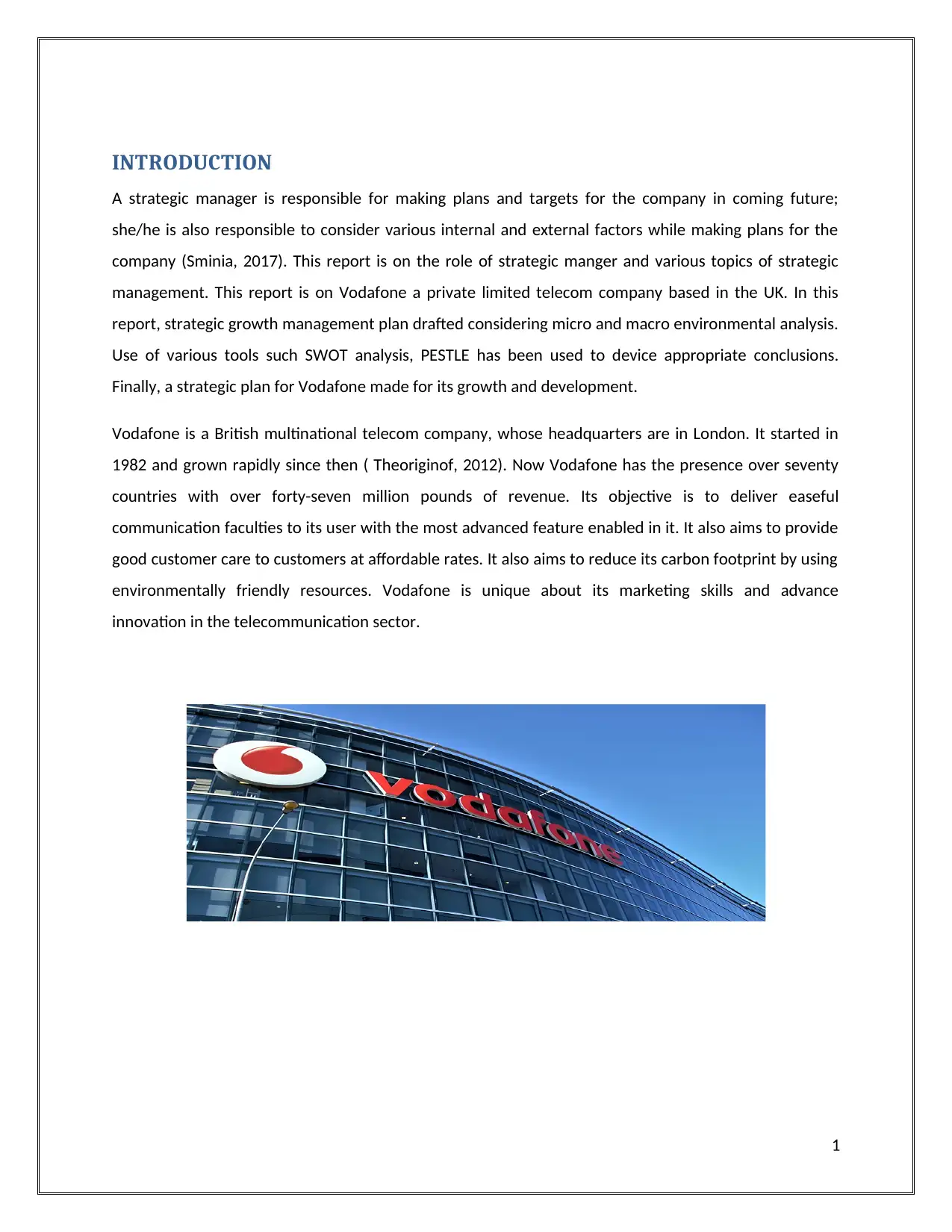
INTRODUCTION
A strategic manager is responsible for making plans and targets for the company in coming future;
she/he is also responsible to consider various internal and external factors while making plans for the
company (Sminia, 2017). This report is on the role of strategic manger and various topics of strategic
management. This report is on Vodafone a private limited telecom company based in the UK. In this
report, strategic growth management plan drafted considering micro and macro environmental analysis.
Use of various tools such SWOT analysis, PESTLE has been used to device appropriate conclusions.
Finally, a strategic plan for Vodafone made for its growth and development.
Vodafone is a British multinational telecom company, whose headquarters are in London. It started in
1982 and grown rapidly since then ( Theoriginof, 2012). Now Vodafone has the presence over seventy
countries with over forty-seven million pounds of revenue. Its objective is to deliver easeful
communication faculties to its user with the most advanced feature enabled in it. It also aims to provide
good customer care to customers at affordable rates. It also aims to reduce its carbon footprint by using
environmentally friendly resources. Vodafone is unique about its marketing skills and advance
innovation in the telecommunication sector.
1
A strategic manager is responsible for making plans and targets for the company in coming future;
she/he is also responsible to consider various internal and external factors while making plans for the
company (Sminia, 2017). This report is on the role of strategic manger and various topics of strategic
management. This report is on Vodafone a private limited telecom company based in the UK. In this
report, strategic growth management plan drafted considering micro and macro environmental analysis.
Use of various tools such SWOT analysis, PESTLE has been used to device appropriate conclusions.
Finally, a strategic plan for Vodafone made for its growth and development.
Vodafone is a British multinational telecom company, whose headquarters are in London. It started in
1982 and grown rapidly since then ( Theoriginof, 2012). Now Vodafone has the presence over seventy
countries with over forty-seven million pounds of revenue. Its objective is to deliver easeful
communication faculties to its user with the most advanced feature enabled in it. It also aims to provide
good customer care to customers at affordable rates. It also aims to reduce its carbon footprint by using
environmentally friendly resources. Vodafone is unique about its marketing skills and advance
innovation in the telecommunication sector.
1
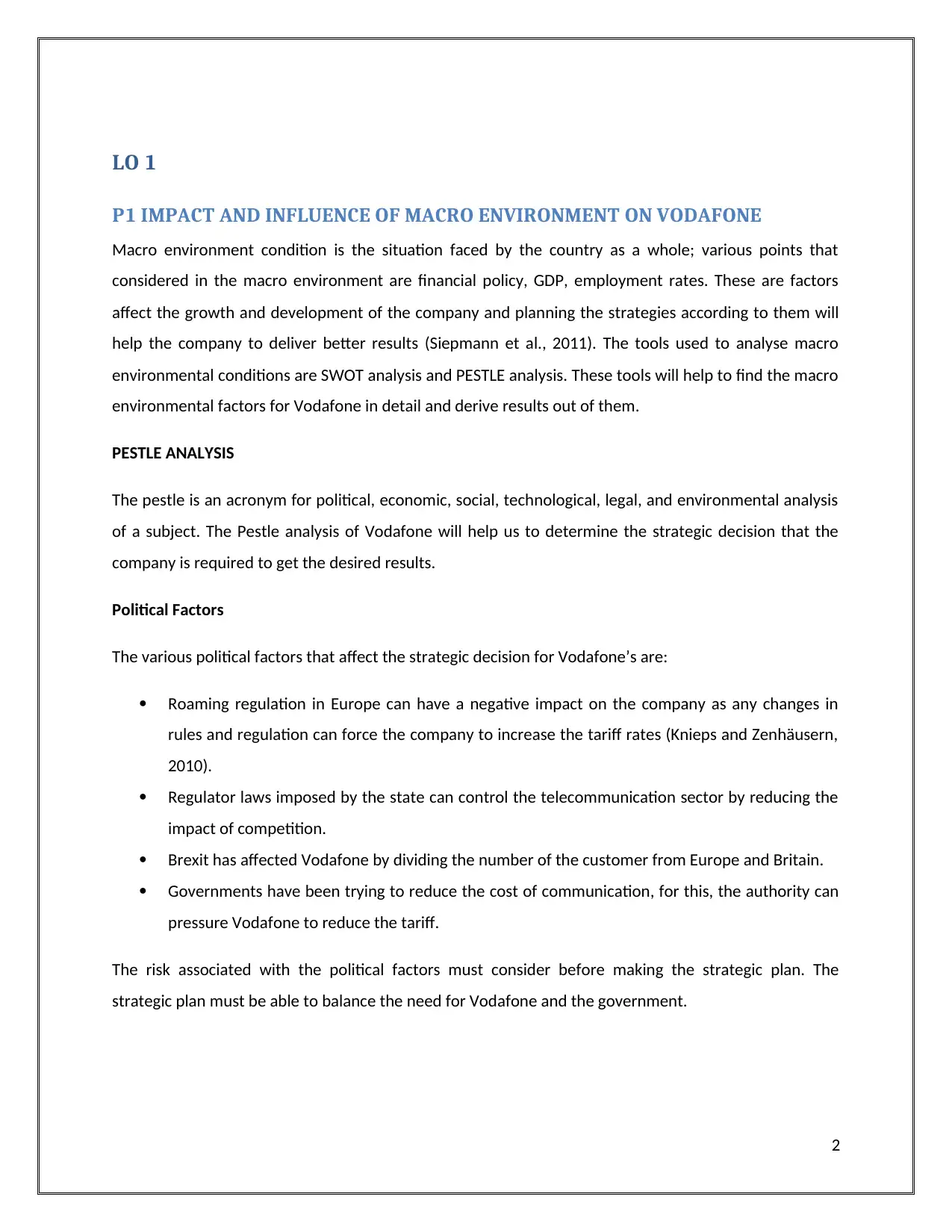
LO 1
P1 IMPACT AND INFLUENCE OF MACRO ENVIRONMENT ON VODAFONE
Macro environment condition is the situation faced by the country as a whole; various points that
considered in the macro environment are financial policy, GDP, employment rates. These are factors
affect the growth and development of the company and planning the strategies according to them will
help the company to deliver better results (Siepmann et al., 2011). The tools used to analyse macro
environmental conditions are SWOT analysis and PESTLE analysis. These tools will help to find the macro
environmental factors for Vodafone in detail and derive results out of them.
PESTLE ANALYSIS
The pestle is an acronym for political, economic, social, technological, legal, and environmental analysis
of a subject. The Pestle analysis of Vodafone will help us to determine the strategic decision that the
company is required to get the desired results.
Political Factors
The various political factors that affect the strategic decision for Vodafone’s are:
Roaming regulation in Europe can have a negative impact on the company as any changes in
rules and regulation can force the company to increase the tariff rates (Knieps and Zenhäusern,
2010).
Regulator laws imposed by the state can control the telecommunication sector by reducing the
impact of competition.
Brexit has affected Vodafone by dividing the number of the customer from Europe and Britain.
Governments have been trying to reduce the cost of communication, for this, the authority can
pressure Vodafone to reduce the tariff.
The risk associated with the political factors must consider before making the strategic plan. The
strategic plan must be able to balance the need for Vodafone and the government.
2
P1 IMPACT AND INFLUENCE OF MACRO ENVIRONMENT ON VODAFONE
Macro environment condition is the situation faced by the country as a whole; various points that
considered in the macro environment are financial policy, GDP, employment rates. These are factors
affect the growth and development of the company and planning the strategies according to them will
help the company to deliver better results (Siepmann et al., 2011). The tools used to analyse macro
environmental conditions are SWOT analysis and PESTLE analysis. These tools will help to find the macro
environmental factors for Vodafone in detail and derive results out of them.
PESTLE ANALYSIS
The pestle is an acronym for political, economic, social, technological, legal, and environmental analysis
of a subject. The Pestle analysis of Vodafone will help us to determine the strategic decision that the
company is required to get the desired results.
Political Factors
The various political factors that affect the strategic decision for Vodafone’s are:
Roaming regulation in Europe can have a negative impact on the company as any changes in
rules and regulation can force the company to increase the tariff rates (Knieps and Zenhäusern,
2010).
Regulator laws imposed by the state can control the telecommunication sector by reducing the
impact of competition.
Brexit has affected Vodafone by dividing the number of the customer from Europe and Britain.
Governments have been trying to reduce the cost of communication, for this, the authority can
pressure Vodafone to reduce the tariff.
The risk associated with the political factors must consider before making the strategic plan. The
strategic plan must be able to balance the need for Vodafone and the government.
2
⊘ This is a preview!⊘
Do you want full access?
Subscribe today to unlock all pages.

Trusted by 1+ million students worldwide
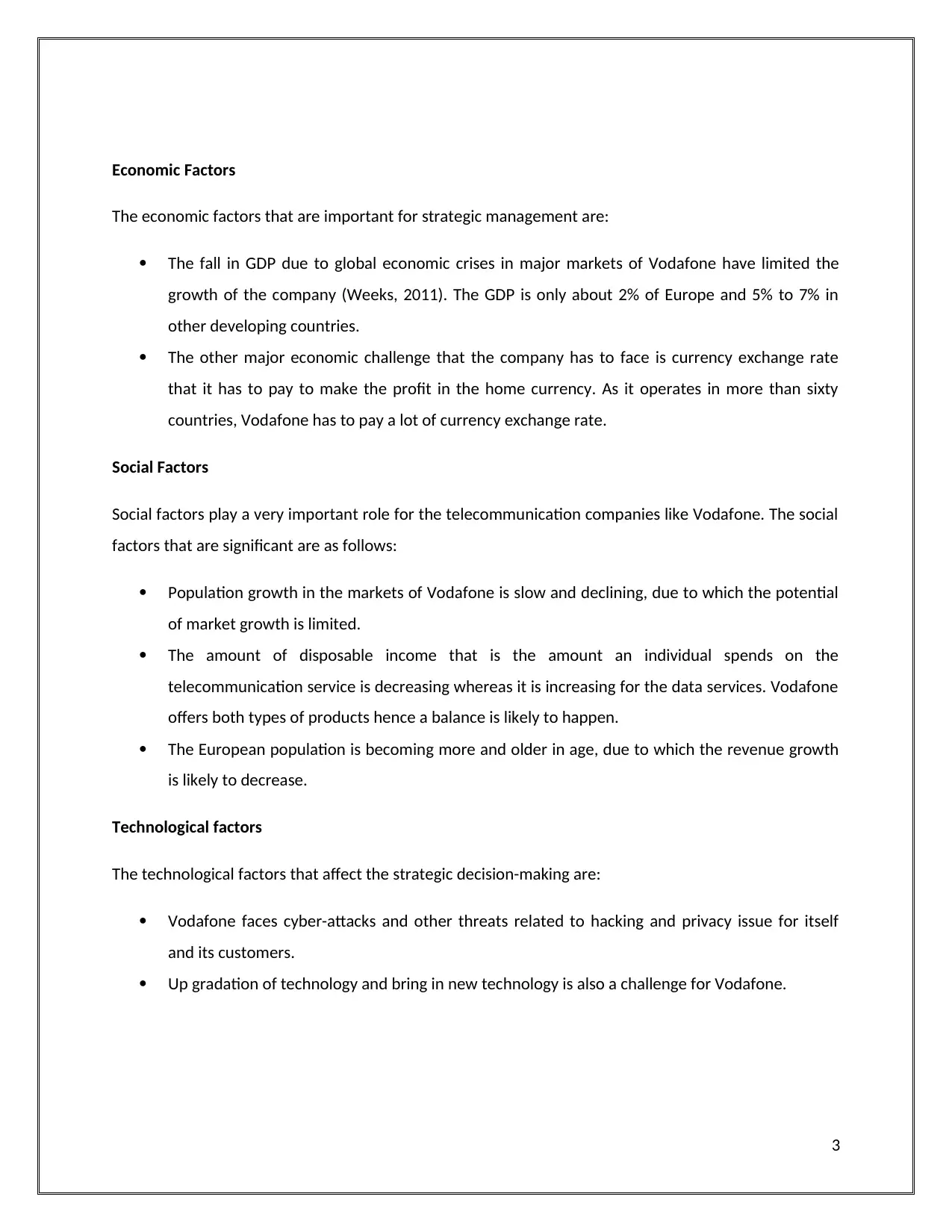
Economic Factors
The economic factors that are important for strategic management are:
The fall in GDP due to global economic crises in major markets of Vodafone have limited the
growth of the company (Weeks, 2011). The GDP is only about 2% of Europe and 5% to 7% in
other developing countries.
The other major economic challenge that the company has to face is currency exchange rate
that it has to pay to make the profit in the home currency. As it operates in more than sixty
countries, Vodafone has to pay a lot of currency exchange rate.
Social Factors
Social factors play a very important role for the telecommunication companies like Vodafone. The social
factors that are significant are as follows:
Population growth in the markets of Vodafone is slow and declining, due to which the potential
of market growth is limited.
The amount of disposable income that is the amount an individual spends on the
telecommunication service is decreasing whereas it is increasing for the data services. Vodafone
offers both types of products hence a balance is likely to happen.
The European population is becoming more and older in age, due to which the revenue growth
is likely to decrease.
Technological factors
The technological factors that affect the strategic decision-making are:
Vodafone faces cyber-attacks and other threats related to hacking and privacy issue for itself
and its customers.
Up gradation of technology and bring in new technology is also a challenge for Vodafone.
3
The economic factors that are important for strategic management are:
The fall in GDP due to global economic crises in major markets of Vodafone have limited the
growth of the company (Weeks, 2011). The GDP is only about 2% of Europe and 5% to 7% in
other developing countries.
The other major economic challenge that the company has to face is currency exchange rate
that it has to pay to make the profit in the home currency. As it operates in more than sixty
countries, Vodafone has to pay a lot of currency exchange rate.
Social Factors
Social factors play a very important role for the telecommunication companies like Vodafone. The social
factors that are significant are as follows:
Population growth in the markets of Vodafone is slow and declining, due to which the potential
of market growth is limited.
The amount of disposable income that is the amount an individual spends on the
telecommunication service is decreasing whereas it is increasing for the data services. Vodafone
offers both types of products hence a balance is likely to happen.
The European population is becoming more and older in age, due to which the revenue growth
is likely to decrease.
Technological factors
The technological factors that affect the strategic decision-making are:
Vodafone faces cyber-attacks and other threats related to hacking and privacy issue for itself
and its customers.
Up gradation of technology and bring in new technology is also a challenge for Vodafone.
3
Paraphrase This Document
Need a fresh take? Get an instant paraphrase of this document with our AI Paraphraser
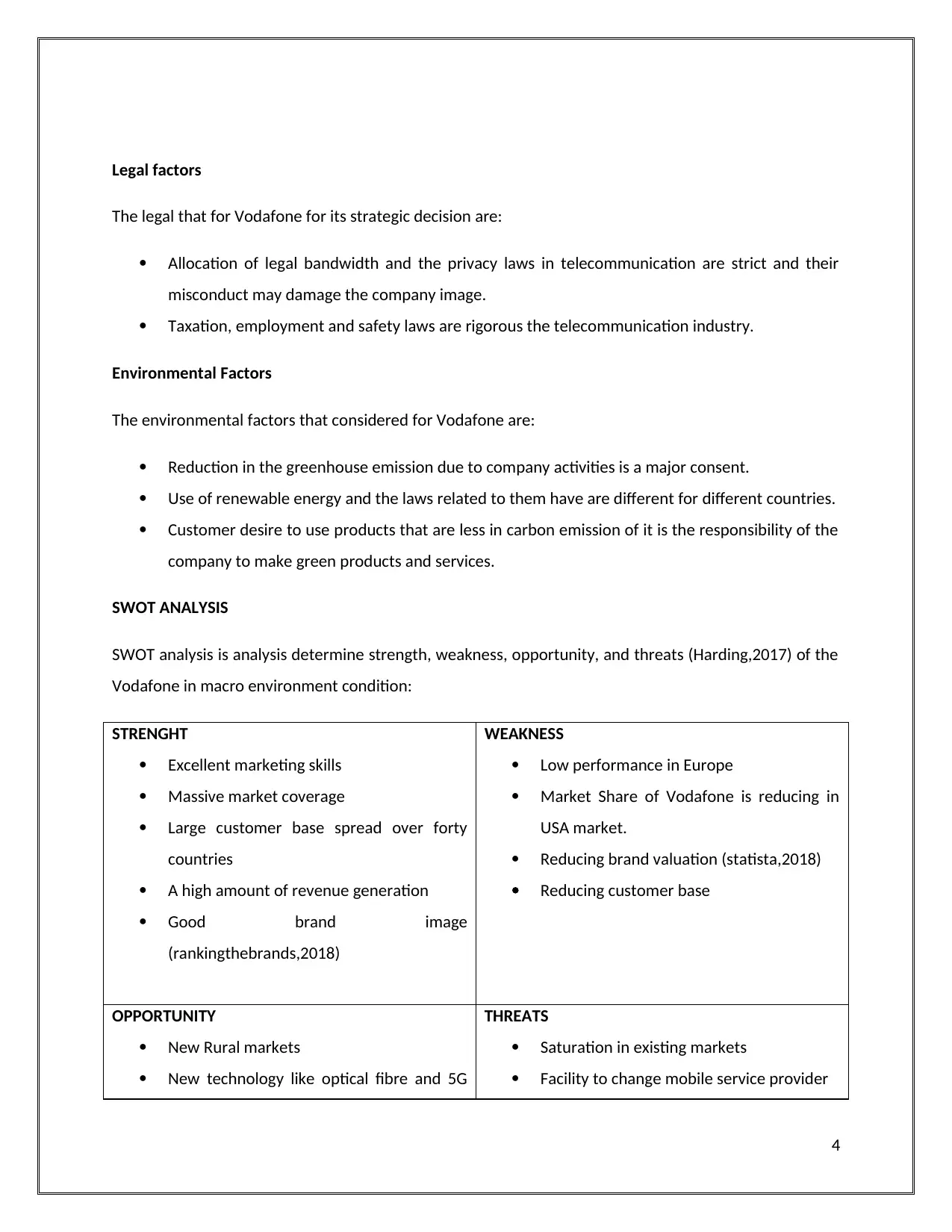
Legal factors
The legal that for Vodafone for its strategic decision are:
Allocation of legal bandwidth and the privacy laws in telecommunication are strict and their
misconduct may damage the company image.
Taxation, employment and safety laws are rigorous the telecommunication industry.
Environmental Factors
The environmental factors that considered for Vodafone are:
Reduction in the greenhouse emission due to company activities is a major consent.
Use of renewable energy and the laws related to them have are different for different countries.
Customer desire to use products that are less in carbon emission of it is the responsibility of the
company to make green products and services.
SWOT ANALYSIS
SWOT analysis is analysis determine strength, weakness, opportunity, and threats (Harding,2017) of the
Vodafone in macro environment condition:
STRENGHT
Excellent marketing skills
Massive market coverage
Large customer base spread over forty
countries
A high amount of revenue generation
Good brand image
(rankingthebrands,2018)
WEAKNESS
Low performance in Europe
Market Share of Vodafone is reducing in
USA market.
Reducing brand valuation (statista,2018)
Reducing customer base
OPPORTUNITY
New Rural markets
New technology like optical fibre and 5G
THREATS
Saturation in existing markets
Facility to change mobile service provider
4
The legal that for Vodafone for its strategic decision are:
Allocation of legal bandwidth and the privacy laws in telecommunication are strict and their
misconduct may damage the company image.
Taxation, employment and safety laws are rigorous the telecommunication industry.
Environmental Factors
The environmental factors that considered for Vodafone are:
Reduction in the greenhouse emission due to company activities is a major consent.
Use of renewable energy and the laws related to them have are different for different countries.
Customer desire to use products that are less in carbon emission of it is the responsibility of the
company to make green products and services.
SWOT ANALYSIS
SWOT analysis is analysis determine strength, weakness, opportunity, and threats (Harding,2017) of the
Vodafone in macro environment condition:
STRENGHT
Excellent marketing skills
Massive market coverage
Large customer base spread over forty
countries
A high amount of revenue generation
Good brand image
(rankingthebrands,2018)
WEAKNESS
Low performance in Europe
Market Share of Vodafone is reducing in
USA market.
Reducing brand valuation (statista,2018)
Reducing customer base
OPPORTUNITY
New Rural markets
New technology like optical fibre and 5G
THREATS
Saturation in existing markets
Facility to change mobile service provider
4
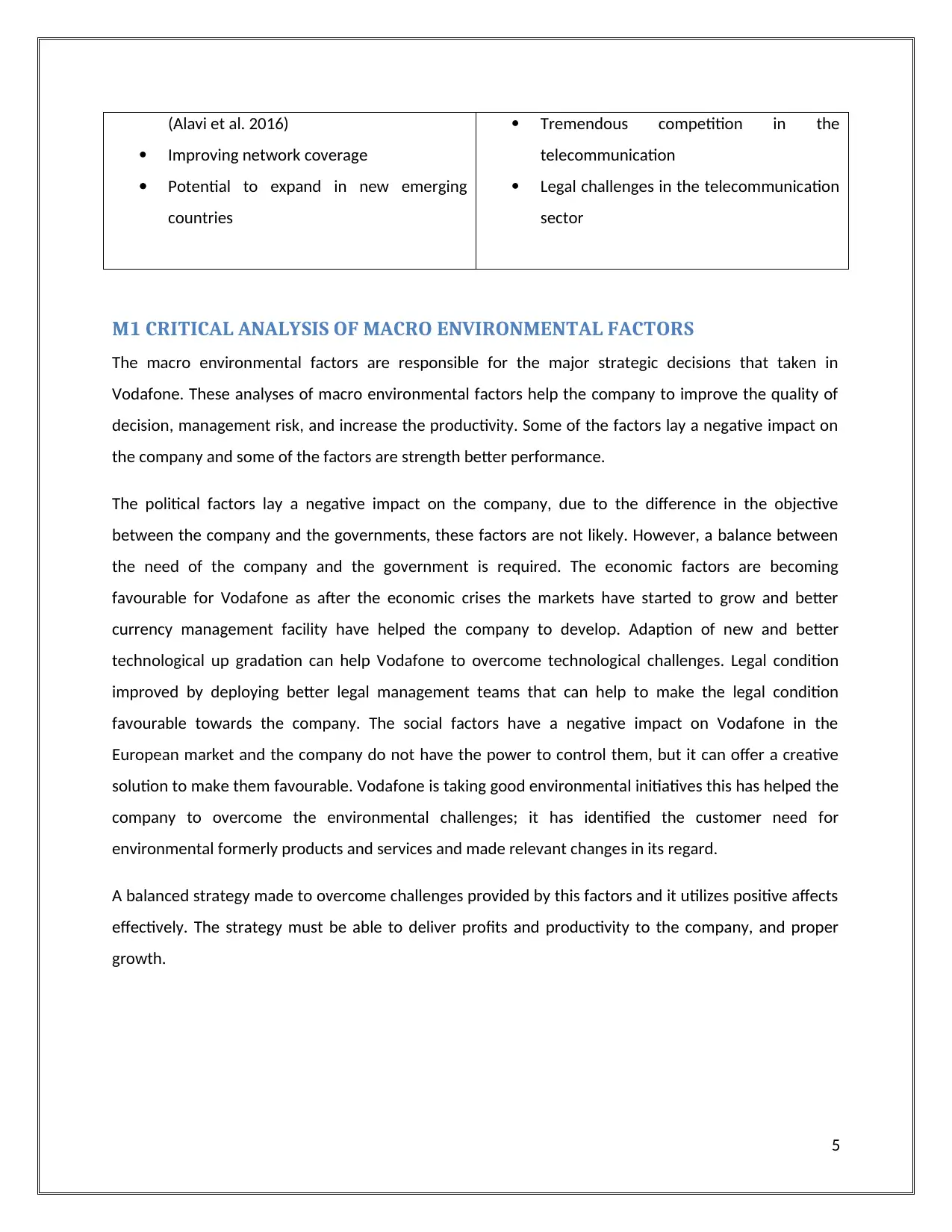
(Alavi et al. 2016)
Improving network coverage
Potential to expand in new emerging
countries
Tremendous competition in the
telecommunication
Legal challenges in the telecommunication
sector
M1 CRITICAL ANALYSIS OF MACRO ENVIRONMENTAL FACTORS
The macro environmental factors are responsible for the major strategic decisions that taken in
Vodafone. These analyses of macro environmental factors help the company to improve the quality of
decision, management risk, and increase the productivity. Some of the factors lay a negative impact on
the company and some of the factors are strength better performance.
The political factors lay a negative impact on the company, due to the difference in the objective
between the company and the governments, these factors are not likely. However, a balance between
the need of the company and the government is required. The economic factors are becoming
favourable for Vodafone as after the economic crises the markets have started to grow and better
currency management facility have helped the company to develop. Adaption of new and better
technological up gradation can help Vodafone to overcome technological challenges. Legal condition
improved by deploying better legal management teams that can help to make the legal condition
favourable towards the company. The social factors have a negative impact on Vodafone in the
European market and the company do not have the power to control them, but it can offer a creative
solution to make them favourable. Vodafone is taking good environmental initiatives this has helped the
company to overcome the environmental challenges; it has identified the customer need for
environmental formerly products and services and made relevant changes in its regard.
A balanced strategy made to overcome challenges provided by this factors and it utilizes positive affects
effectively. The strategy must be able to deliver profits and productivity to the company, and proper
growth.
5
Improving network coverage
Potential to expand in new emerging
countries
Tremendous competition in the
telecommunication
Legal challenges in the telecommunication
sector
M1 CRITICAL ANALYSIS OF MACRO ENVIRONMENTAL FACTORS
The macro environmental factors are responsible for the major strategic decisions that taken in
Vodafone. These analyses of macro environmental factors help the company to improve the quality of
decision, management risk, and increase the productivity. Some of the factors lay a negative impact on
the company and some of the factors are strength better performance.
The political factors lay a negative impact on the company, due to the difference in the objective
between the company and the governments, these factors are not likely. However, a balance between
the need of the company and the government is required. The economic factors are becoming
favourable for Vodafone as after the economic crises the markets have started to grow and better
currency management facility have helped the company to develop. Adaption of new and better
technological up gradation can help Vodafone to overcome technological challenges. Legal condition
improved by deploying better legal management teams that can help to make the legal condition
favourable towards the company. The social factors have a negative impact on Vodafone in the
European market and the company do not have the power to control them, but it can offer a creative
solution to make them favourable. Vodafone is taking good environmental initiatives this has helped the
company to overcome the environmental challenges; it has identified the customer need for
environmental formerly products and services and made relevant changes in its regard.
A balanced strategy made to overcome challenges provided by this factors and it utilizes positive affects
effectively. The strategy must be able to deliver profits and productivity to the company, and proper
growth.
5
⊘ This is a preview!⊘
Do you want full access?
Subscribe today to unlock all pages.

Trusted by 1+ million students worldwide
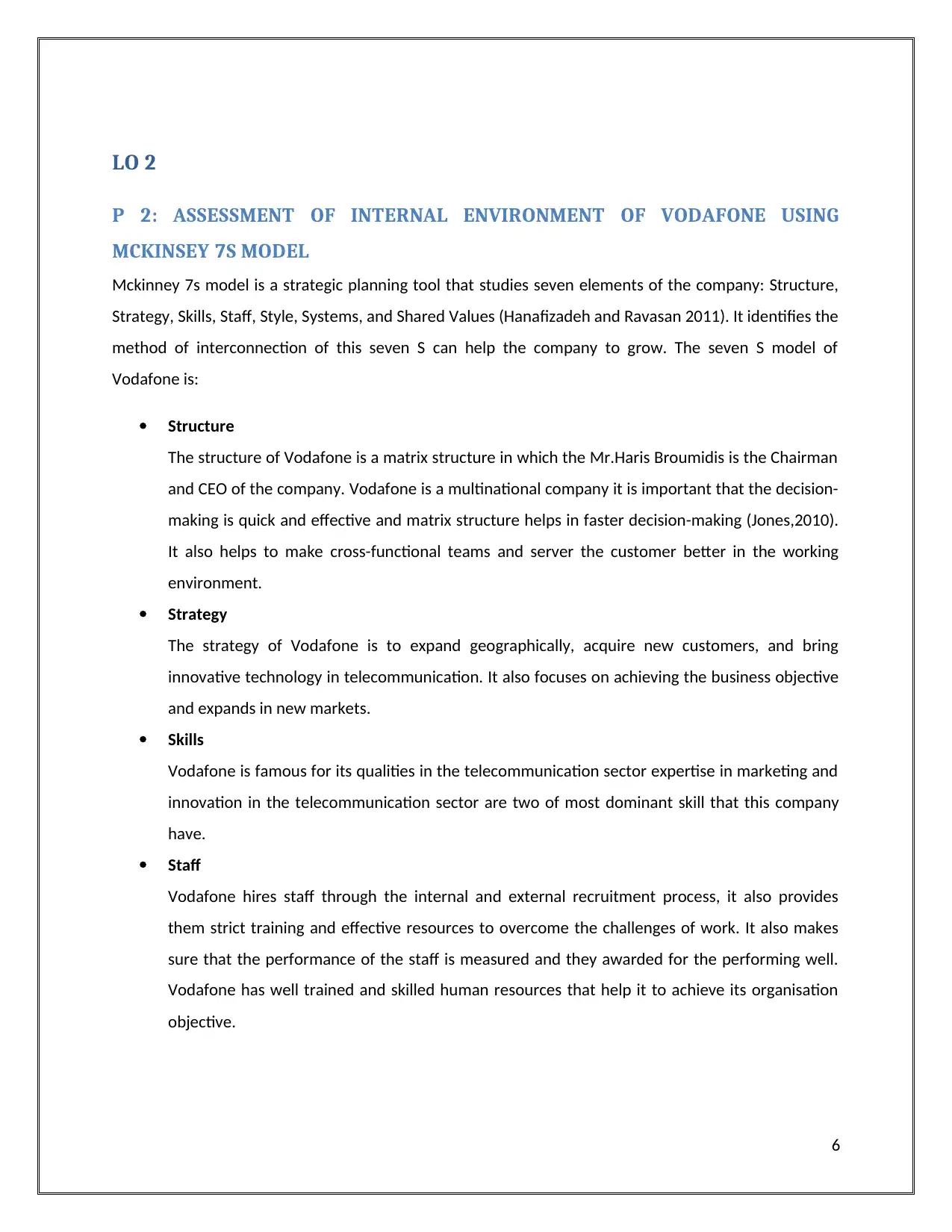
LO 2
P 2: ASSESSMENT OF INTERNAL ENVIRONMENT OF VODAFONE USING
MCKINSEY 7S MODEL
Mckinney 7s model is a strategic planning tool that studies seven elements of the company: Structure,
Strategy, Skills, Staff, Style, Systems, and Shared Values (Hanafizadeh and Ravasan 2011). It identifies the
method of interconnection of this seven S can help the company to grow. The seven S model of
Vodafone is:
Structure
The structure of Vodafone is a matrix structure in which the Mr.Haris Broumidis is the Chairman
and CEO of the company. Vodafone is a multinational company it is important that the decision-
making is quick and effective and matrix structure helps in faster decision-making (Jones,2010).
It also helps to make cross-functional teams and server the customer better in the working
environment.
Strategy
The strategy of Vodafone is to expand geographically, acquire new customers, and bring
innovative technology in telecommunication. It also focuses on achieving the business objective
and expands in new markets.
Skills
Vodafone is famous for its qualities in the telecommunication sector expertise in marketing and
innovation in the telecommunication sector are two of most dominant skill that this company
have.
Staff
Vodafone hires staff through the internal and external recruitment process, it also provides
them strict training and effective resources to overcome the challenges of work. It also makes
sure that the performance of the staff is measured and they awarded for the performing well.
Vodafone has well trained and skilled human resources that help it to achieve its organisation
objective.
6
P 2: ASSESSMENT OF INTERNAL ENVIRONMENT OF VODAFONE USING
MCKINSEY 7S MODEL
Mckinney 7s model is a strategic planning tool that studies seven elements of the company: Structure,
Strategy, Skills, Staff, Style, Systems, and Shared Values (Hanafizadeh and Ravasan 2011). It identifies the
method of interconnection of this seven S can help the company to grow. The seven S model of
Vodafone is:
Structure
The structure of Vodafone is a matrix structure in which the Mr.Haris Broumidis is the Chairman
and CEO of the company. Vodafone is a multinational company it is important that the decision-
making is quick and effective and matrix structure helps in faster decision-making (Jones,2010).
It also helps to make cross-functional teams and server the customer better in the working
environment.
Strategy
The strategy of Vodafone is to expand geographically, acquire new customers, and bring
innovative technology in telecommunication. It also focuses on achieving the business objective
and expands in new markets.
Skills
Vodafone is famous for its qualities in the telecommunication sector expertise in marketing and
innovation in the telecommunication sector are two of most dominant skill that this company
have.
Staff
Vodafone hires staff through the internal and external recruitment process, it also provides
them strict training and effective resources to overcome the challenges of work. It also makes
sure that the performance of the staff is measured and they awarded for the performing well.
Vodafone has well trained and skilled human resources that help it to achieve its organisation
objective.
6
Paraphrase This Document
Need a fresh take? Get an instant paraphrase of this document with our AI Paraphraser
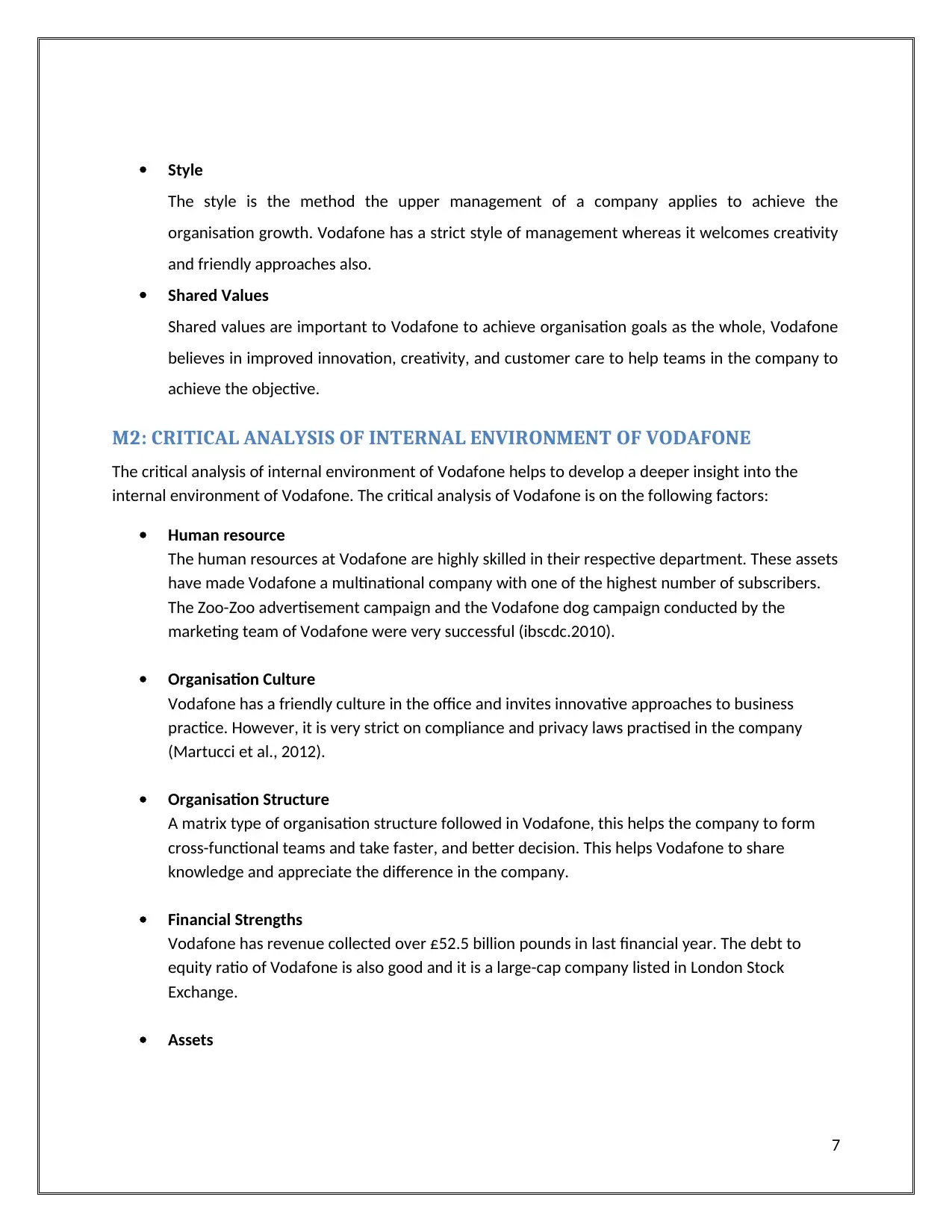
Style
The style is the method the upper management of a company applies to achieve the
organisation growth. Vodafone has a strict style of management whereas it welcomes creativity
and friendly approaches also.
Shared Values
Shared values are important to Vodafone to achieve organisation goals as the whole, Vodafone
believes in improved innovation, creativity, and customer care to help teams in the company to
achieve the objective.
M2: CRITICAL ANALYSIS OF INTERNAL ENVIRONMENT OF VODAFONE
The critical analysis of internal environment of Vodafone helps to develop a deeper insight into the
internal environment of Vodafone. The critical analysis of Vodafone is on the following factors:
Human resource
The human resources at Vodafone are highly skilled in their respective department. These assets
have made Vodafone a multinational company with one of the highest number of subscribers.
The Zoo-Zoo advertisement campaign and the Vodafone dog campaign conducted by the
marketing team of Vodafone were very successful (ibscdc.2010).
Organisation Culture
Vodafone has a friendly culture in the office and invites innovative approaches to business
practice. However, it is very strict on compliance and privacy laws practised in the company
(Martucci et al., 2012).
Organisation Structure
A matrix type of organisation structure followed in Vodafone, this helps the company to form
cross-functional teams and take faster, and better decision. This helps Vodafone to share
knowledge and appreciate the difference in the company.
Financial Strengths
Vodafone has revenue collected over £52.5 billion pounds in last financial year. The debt to
equity ratio of Vodafone is also good and it is a large-cap company listed in London Stock
Exchange.
Assets
7
The style is the method the upper management of a company applies to achieve the
organisation growth. Vodafone has a strict style of management whereas it welcomes creativity
and friendly approaches also.
Shared Values
Shared values are important to Vodafone to achieve organisation goals as the whole, Vodafone
believes in improved innovation, creativity, and customer care to help teams in the company to
achieve the objective.
M2: CRITICAL ANALYSIS OF INTERNAL ENVIRONMENT OF VODAFONE
The critical analysis of internal environment of Vodafone helps to develop a deeper insight into the
internal environment of Vodafone. The critical analysis of Vodafone is on the following factors:
Human resource
The human resources at Vodafone are highly skilled in their respective department. These assets
have made Vodafone a multinational company with one of the highest number of subscribers.
The Zoo-Zoo advertisement campaign and the Vodafone dog campaign conducted by the
marketing team of Vodafone were very successful (ibscdc.2010).
Organisation Culture
Vodafone has a friendly culture in the office and invites innovative approaches to business
practice. However, it is very strict on compliance and privacy laws practised in the company
(Martucci et al., 2012).
Organisation Structure
A matrix type of organisation structure followed in Vodafone, this helps the company to form
cross-functional teams and take faster, and better decision. This helps Vodafone to share
knowledge and appreciate the difference in the company.
Financial Strengths
Vodafone has revenue collected over £52.5 billion pounds in last financial year. The debt to
equity ratio of Vodafone is also good and it is a large-cap company listed in London Stock
Exchange.
Assets
7
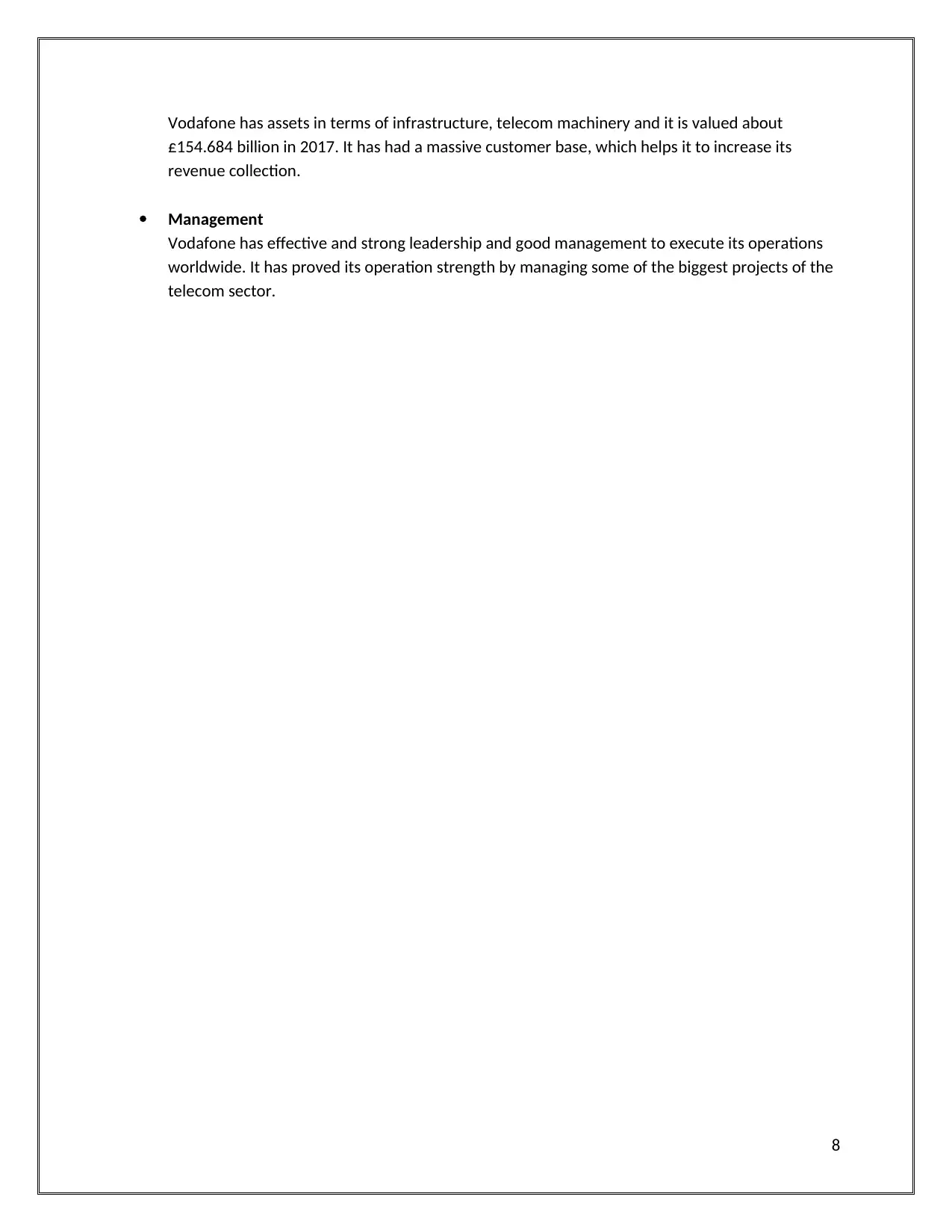
Vodafone has assets in terms of infrastructure, telecom machinery and it is valued about
£154.684 billion in 2017. It has had a massive customer base, which helps it to increase its
revenue collection.
Management
Vodafone has effective and strong leadership and good management to execute its operations
worldwide. It has proved its operation strength by managing some of the biggest projects of the
telecom sector.
8
£154.684 billion in 2017. It has had a massive customer base, which helps it to increase its
revenue collection.
Management
Vodafone has effective and strong leadership and good management to execute its operations
worldwide. It has proved its operation strength by managing some of the biggest projects of the
telecom sector.
8
⊘ This is a preview!⊘
Do you want full access?
Subscribe today to unlock all pages.

Trusted by 1+ million students worldwide
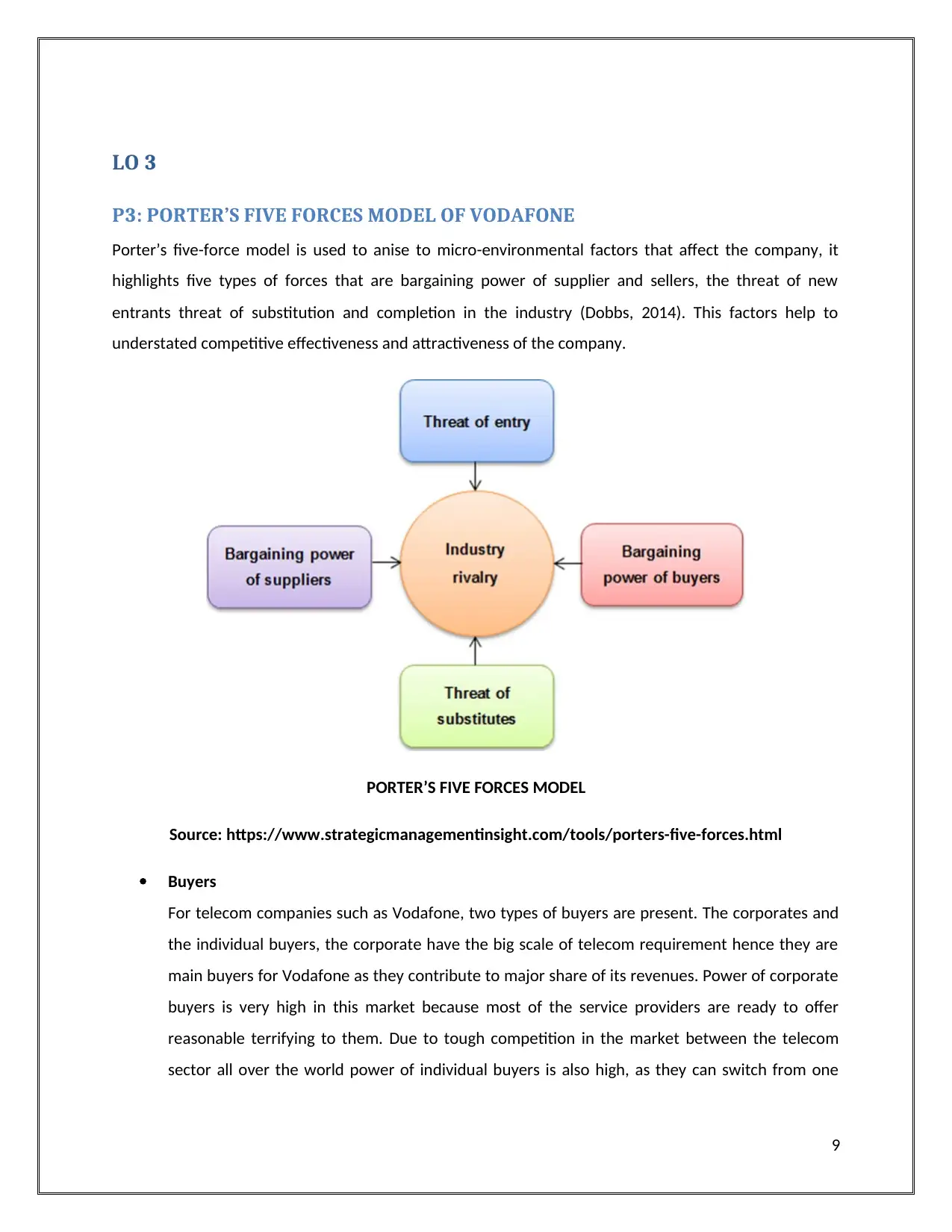
LO 3
P3: PORTER’S FIVE FORCES MODEL OF VODAFONE
Porter’s five-force model is used to anise to micro-environmental factors that affect the company, it
highlights five types of forces that are bargaining power of supplier and sellers, the threat of new
entrants threat of substitution and completion in the industry (Dobbs, 2014). This factors help to
understated competitive effectiveness and attractiveness of the company.
PORTER’S FIVE FORCES MODEL
Source: https://www.strategicmanagementinsight.com/tools/porters-five-forces.html
Buyers
For telecom companies such as Vodafone, two types of buyers are present. The corporates and
the individual buyers, the corporate have the big scale of telecom requirement hence they are
main buyers for Vodafone as they contribute to major share of its revenues. Power of corporate
buyers is very high in this market because most of the service providers are ready to offer
reasonable terrifying to them. Due to tough competition in the market between the telecom
sector all over the world power of individual buyers is also high, as they can switch from one
9
P3: PORTER’S FIVE FORCES MODEL OF VODAFONE
Porter’s five-force model is used to anise to micro-environmental factors that affect the company, it
highlights five types of forces that are bargaining power of supplier and sellers, the threat of new
entrants threat of substitution and completion in the industry (Dobbs, 2014). This factors help to
understated competitive effectiveness and attractiveness of the company.
PORTER’S FIVE FORCES MODEL
Source: https://www.strategicmanagementinsight.com/tools/porters-five-forces.html
Buyers
For telecom companies such as Vodafone, two types of buyers are present. The corporates and
the individual buyers, the corporate have the big scale of telecom requirement hence they are
main buyers for Vodafone as they contribute to major share of its revenues. Power of corporate
buyers is very high in this market because most of the service providers are ready to offer
reasonable terrifying to them. Due to tough competition in the market between the telecom
sector all over the world power of individual buyers is also high, as they can switch from one
9
Paraphrase This Document
Need a fresh take? Get an instant paraphrase of this document with our AI Paraphraser
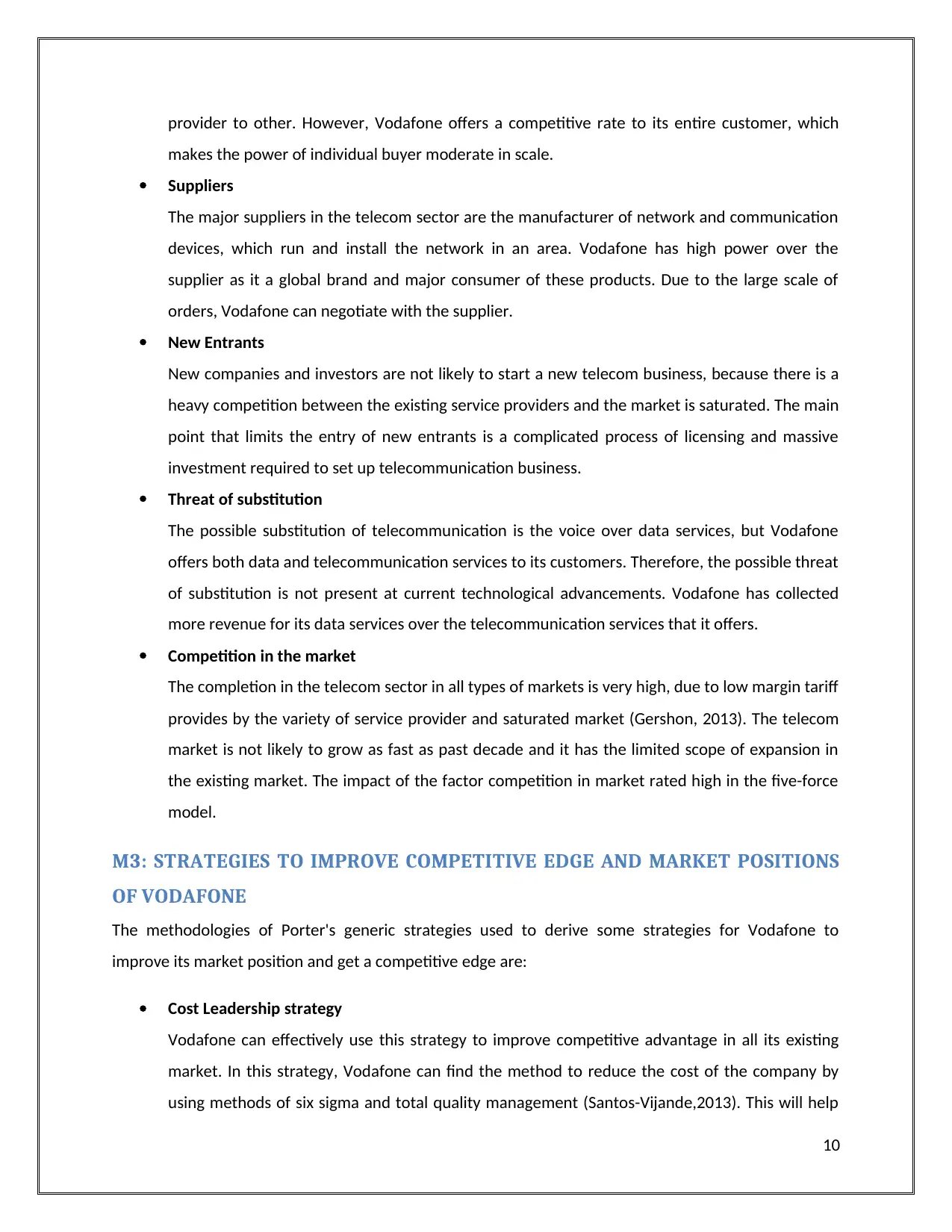
provider to other. However, Vodafone offers a competitive rate to its entire customer, which
makes the power of individual buyer moderate in scale.
Suppliers
The major suppliers in the telecom sector are the manufacturer of network and communication
devices, which run and install the network in an area. Vodafone has high power over the
supplier as it a global brand and major consumer of these products. Due to the large scale of
orders, Vodafone can negotiate with the supplier.
New Entrants
New companies and investors are not likely to start a new telecom business, because there is a
heavy competition between the existing service providers and the market is saturated. The main
point that limits the entry of new entrants is a complicated process of licensing and massive
investment required to set up telecommunication business.
Threat of substitution
The possible substitution of telecommunication is the voice over data services, but Vodafone
offers both data and telecommunication services to its customers. Therefore, the possible threat
of substitution is not present at current technological advancements. Vodafone has collected
more revenue for its data services over the telecommunication services that it offers.
Competition in the market
The completion in the telecom sector in all types of markets is very high, due to low margin tariff
provides by the variety of service provider and saturated market (Gershon, 2013). The telecom
market is not likely to grow as fast as past decade and it has the limited scope of expansion in
the existing market. The impact of the factor competition in market rated high in the five-force
model.
M3: STRATEGIES TO IMPROVE COMPETITIVE EDGE AND MARKET POSITIONS
OF VODAFONE
The methodologies of Porter's generic strategies used to derive some strategies for Vodafone to
improve its market position and get a competitive edge are:
Cost Leadership strategy
Vodafone can effectively use this strategy to improve competitive advantage in all its existing
market. In this strategy, Vodafone can find the method to reduce the cost of the company by
using methods of six sigma and total quality management (Santos-Vijande,2013). This will help
10
makes the power of individual buyer moderate in scale.
Suppliers
The major suppliers in the telecom sector are the manufacturer of network and communication
devices, which run and install the network in an area. Vodafone has high power over the
supplier as it a global brand and major consumer of these products. Due to the large scale of
orders, Vodafone can negotiate with the supplier.
New Entrants
New companies and investors are not likely to start a new telecom business, because there is a
heavy competition between the existing service providers and the market is saturated. The main
point that limits the entry of new entrants is a complicated process of licensing and massive
investment required to set up telecommunication business.
Threat of substitution
The possible substitution of telecommunication is the voice over data services, but Vodafone
offers both data and telecommunication services to its customers. Therefore, the possible threat
of substitution is not present at current technological advancements. Vodafone has collected
more revenue for its data services over the telecommunication services that it offers.
Competition in the market
The completion in the telecom sector in all types of markets is very high, due to low margin tariff
provides by the variety of service provider and saturated market (Gershon, 2013). The telecom
market is not likely to grow as fast as past decade and it has the limited scope of expansion in
the existing market. The impact of the factor competition in market rated high in the five-force
model.
M3: STRATEGIES TO IMPROVE COMPETITIVE EDGE AND MARKET POSITIONS
OF VODAFONE
The methodologies of Porter's generic strategies used to derive some strategies for Vodafone to
improve its market position and get a competitive edge are:
Cost Leadership strategy
Vodafone can effectively use this strategy to improve competitive advantage in all its existing
market. In this strategy, Vodafone can find the method to reduce the cost of the company by
using methods of six sigma and total quality management (Santos-Vijande,2013). This will help
10
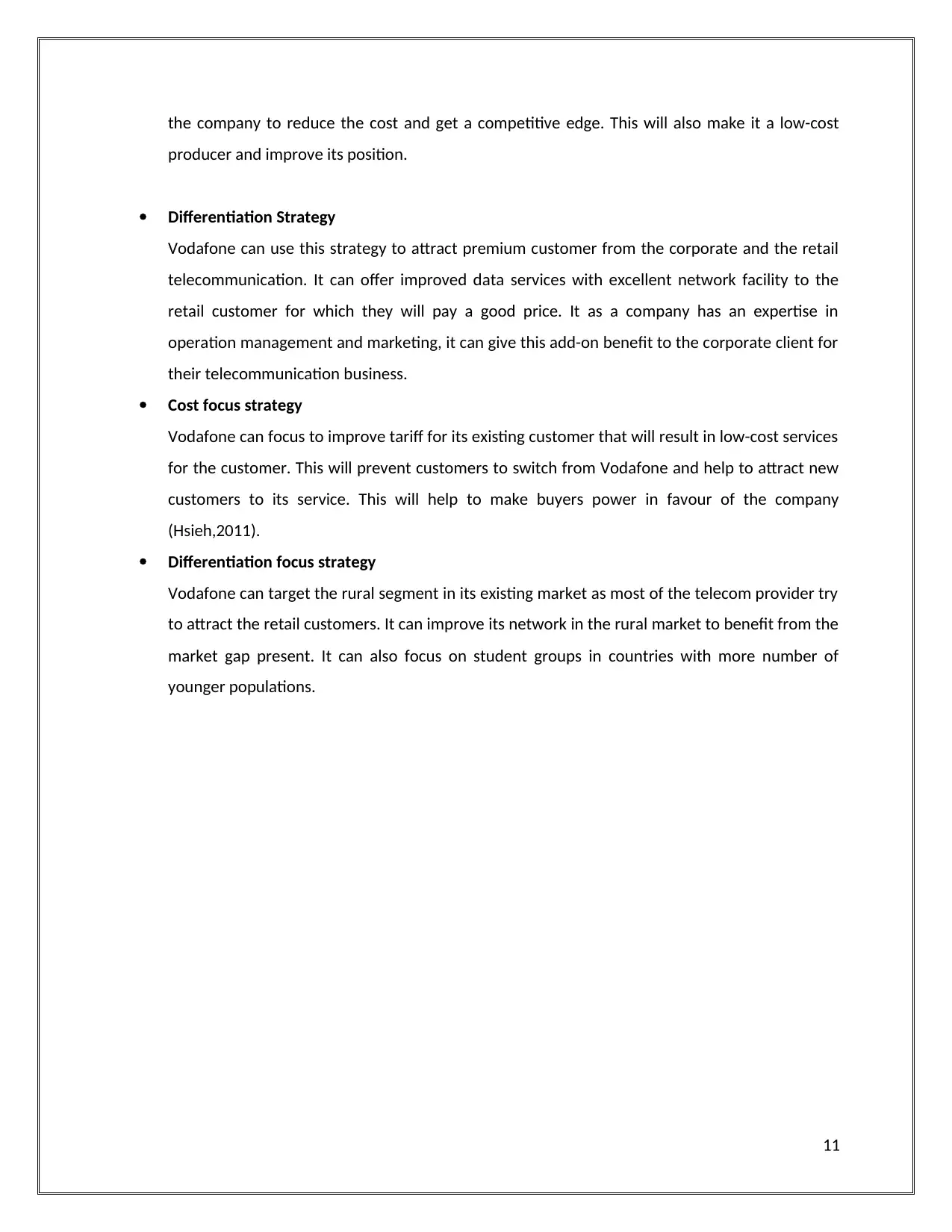
the company to reduce the cost and get a competitive edge. This will also make it a low-cost
producer and improve its position.
Differentiation Strategy
Vodafone can use this strategy to attract premium customer from the corporate and the retail
telecommunication. It can offer improved data services with excellent network facility to the
retail customer for which they will pay a good price. It as a company has an expertise in
operation management and marketing, it can give this add-on benefit to the corporate client for
their telecommunication business.
Cost focus strategy
Vodafone can focus to improve tariff for its existing customer that will result in low-cost services
for the customer. This will prevent customers to switch from Vodafone and help to attract new
customers to its service. This will help to make buyers power in favour of the company
(Hsieh,2011).
Differentiation focus strategy
Vodafone can target the rural segment in its existing market as most of the telecom provider try
to attract the retail customers. It can improve its network in the rural market to benefit from the
market gap present. It can also focus on student groups in countries with more number of
younger populations.
11
producer and improve its position.
Differentiation Strategy
Vodafone can use this strategy to attract premium customer from the corporate and the retail
telecommunication. It can offer improved data services with excellent network facility to the
retail customer for which they will pay a good price. It as a company has an expertise in
operation management and marketing, it can give this add-on benefit to the corporate client for
their telecommunication business.
Cost focus strategy
Vodafone can focus to improve tariff for its existing customer that will result in low-cost services
for the customer. This will prevent customers to switch from Vodafone and help to attract new
customers to its service. This will help to make buyers power in favour of the company
(Hsieh,2011).
Differentiation focus strategy
Vodafone can target the rural segment in its existing market as most of the telecom provider try
to attract the retail customers. It can improve its network in the rural market to benefit from the
market gap present. It can also focus on student groups in countries with more number of
younger populations.
11
⊘ This is a preview!⊘
Do you want full access?
Subscribe today to unlock all pages.

Trusted by 1+ million students worldwide
1 out of 21
Related Documents
Your All-in-One AI-Powered Toolkit for Academic Success.
+13062052269
info@desklib.com
Available 24*7 on WhatsApp / Email
![[object Object]](/_next/static/media/star-bottom.7253800d.svg)
Unlock your academic potential
Copyright © 2020–2025 A2Z Services. All Rights Reserved. Developed and managed by ZUCOL.




